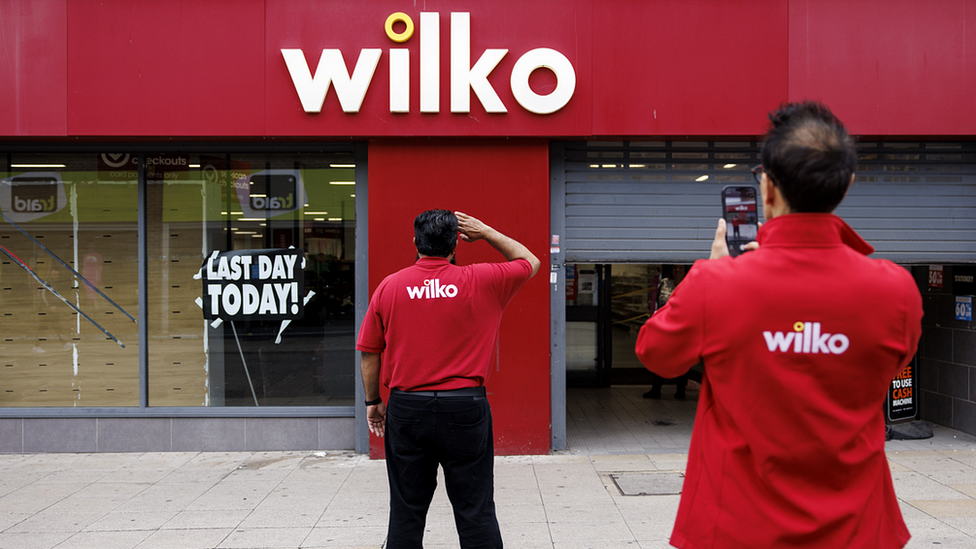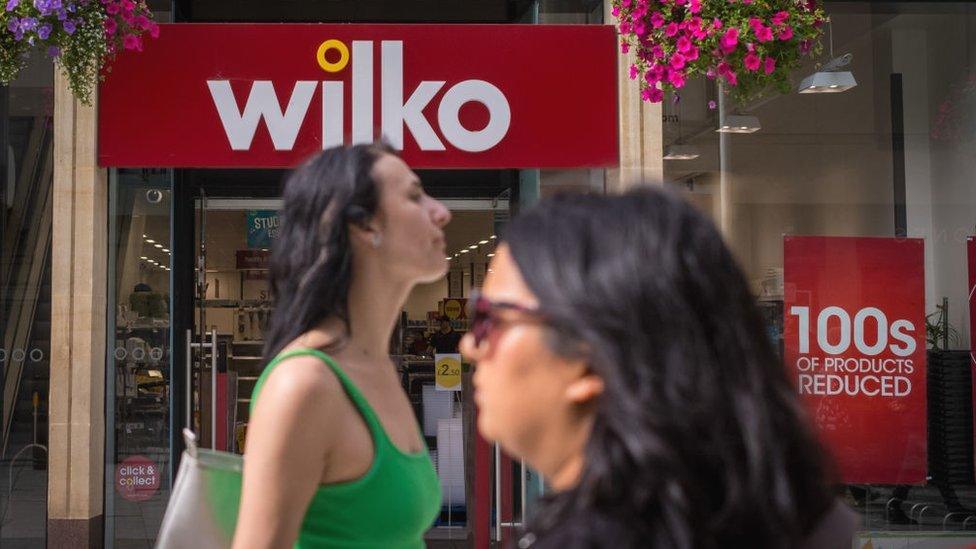Wilko: Lisa Wilkinson 'devastated' over the firm's failure
- Published
Lisa Wilkinson says she is "devastated" that Wilko has let down its former workers, their suppliers and customers.
Wilko's chair and granddaughter of the founder has said she is "devastated" for letting down workers, suppliers and customers of the collapsed retailer.
Lisa Wilkinson told MPs that "we have let each and every one of those people down with the insolvency that Wilko has done".
Wilko collapsed in August leaving 12,000 workers facing redundancy.
Ms Wilkinson also said the fallout from last year's mini budget was one of the factors behind the retailer's demise.
The former chair of Wilko was being questioned by MPs on the Business and Trade Committee about the failure of the business that her grandfather started 93 years ago.
In a terse exchange, the committee's chair, Liam Byrne, asked Ms Wilkinson to apologise for Wilko's collapse.
"I don't know how to put into words how sad I am that we have let down all our customers, all our team members, our suppliers, our advisers genuinely, " she said, adding: "I don't know what you want me to say."
Mr Byrne replied: "Sorry was the one word I was looking for."
Ms Wilkinson said: "You can have the word sorry, of course I'm sorry, if you wish me to say the word sorry - I thought devastated covered it. I apologise, I wasn't trying to be clever."
Quizzed over why Wilko collapsed, Ms Wilkinson pointed to a number of reasons including last year's mini budget which she claimed significantly increased the interest rate on a loan with Australia's Macquarie that Wilko was trying to secure.
"We were about to enter into secured lending arrangements with Macquarie when the 2022 mini-budget happened," she said.
"Literally we were in the midst of that, and at that point the interest terms on that loan were hiked massively and that became infeasible. So, that was a contributor."
Wilko's former chief executive Mark Jackson, who was appointed during Christmas 2022, told MPs at the same hearing he believed that one of the reasons the company failed was because it stayed open during Covid.
The retailer had more than £100m in cash at the beginning of 2021. Wilko was grappling with a number of problems but Mr Jackson said that cash began to run down because it continued to pay workers and paid landlords in full.
"I would not have stayed open," he said. "I would have taken advantage and protected the business on the furlough scheme and the rents like 90% of other retailers."
Commenting on why Wilko continued to trade during Covid lockdowns, Ms Wilkinson said: "The history of Wilko is that it has always stayed open. It stayed open throughout World War Two.
"We were an essential retailer. We debated at great length as a board whether we should stay open."
A year later in January 2022, Wilko's cash levels had fallen to £57.8m and it reported a £38m pre-tax loss compared to a previous profit. The Wilkinson family also paid themselves a dividend of £3m.
Ms Wilkinson said that she had personally not benefitted from the payments and they were made to a company which is controlled by series of family trusts.
'Greed' blocked rescue attempt
Earlier on Tuesday, the owner of HMV detailed how he wanted to rescue most of Wilko's 400 shops but "greed" stood in his way.
Canadian billionaire Doug Putman said firms, including some landlords, had been "super inflexible" and made a deal "literally impossible".
Mr Putman told the BBC's Today programme that when saving businesses it is important to be given access to their IT system for around four months to allow a transition to a new system.
"But for those four months, the amount of money that the companies want to charge made the Wilko deal literally impossible to do and that was something that was found out really late in the game," he said.
"I would say everyone just got a little bit greedy and unfortunately weren't thinking about the 10,000-plus jobs that would have been saved."
Mr Putman had originally hoped to take over 300 of Wilko's 400 shops. But that number later dropped to 100 before he walked away.
Eventually, the owner of Poundland took over the leases of 71 Wilko stores and rebranded them, while discount chain B&M also took over more than 50 shops.
CDS Superstores, which owns The Range retailer, bought Wilko's name and website and is opening five Wilko stores before Christmas.
But thousands of workers ended up losing their jobs.
Wilko was founded in 1930 by James Kemsey Wilkinson, who opened the first shop in Leicester.
By the 1990s, it had become one of Britain's fastest-growing retailers.
But the chain struggled against cheaper rivals as customers, grappling with higher inflation, sought out cheaper goods.
- Published5 November 2023

- Published27 October 2023
